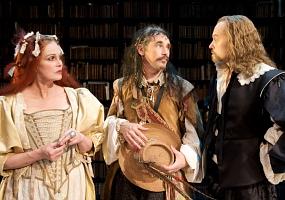La Bete
It only seems a moment ago that actor Mark Rylance was playing the extraordinary and mesmerising character Rooster Byron in the stunning hit 'Jerusalem'. In fact it was 5 months ago when I saw it, which means I suppose that Rylance hot-footed it from the final performance of 'Jerusalem' directly to rehearsals for this new version of 'La Bête'. And in making the transition, Rylance has gone from one kind of extreme character to another, very different kind, but one which nevertheless provides another vehicle for him to demonstrate the staggering range of his acting skills and comic talents.
'La Bête' ('the beast') was written by American David Hirson and first aired in New York in 1991. It didn't do so well there apparently but found commercial success and critical acclaim when it hopped over the Atlantic to the West End, gaining an Olivier Award in 1992 for best comedy, and suggesting that we English have a fondness for off-beat, oddball characters.
The most striking feature of Matthew Warchus's new production - apart from Mark Rylance's riveting performance - is the scale of Mark Thompson's set. Apart from a glimpse of a banquet scene, the play is set in a library which has bookshelves towering up almost to infinity. The library symbolises knowledge, especially of the arts, and the scale reflects the vast, accumulated body of wisdom which turns out to mean almost nothing to Rylance's character, Valere.
It might take a little while to realise that 'La Bête' is written in verse - iambic pentameter if my meagre knowledge of poetry is correct. That may sound rather grand and some may find it off-putting, but it works superbly adding enormously to the humour. The play begins with a banquet in Languedoc, France in the mid seventeenth century. A Princess, played by Joanna Lumley, sponsors a troupe of actors and wants them to join forces with a new actor she's discovered and become enamoured with, called Valere. Elomire is the leader of the acting troupe and is appalled by the idea that the buffoon-like Valere should be forced upon his group.
Mark Rylance's first appearance as Valere results in a monumental monologue - about 30 minutes long if my timing is correct - which is hysterically funny and quite brilliantly written. Having just left the banqueting table, Valere spits food over everyone as he speaks at a non-stop, frantic pace through enormous teeth. His unusual manners - or lack of them - allow him to break wind with alarming ferocity and he avails himself of the toilet (which is only partially concealed behind the bookcase). While he uses the facilities, the monologue continues. Describing his acting abilities, Valere tells us he can recite the Pentateuch (the five books of Moses) from memory but when he - rather foolishly - attempts the feat, he can manage nothing more than the first few words of the first line: "In the beginning ...".
When The Princess arrives in the library, she's adamant that Valere must be given a place in the troupe. Elomire fights against the decision and as a result The Princess agrees to let Valere stage a sample of his work which turns out to be largely unintelligible.
In stark contrast to Rylance's grotesque Valere, David Hyde Pierce (best known to millions as Dr Niles Crane in the TV sitcom 'Frasier') is the aloof intellectual, Elomire, who seethes with indignation at having the rude populist artist Valere thrust on him, but flounders to assert his authority in the face of a force which doesn't play by accepted rules. Joanna Lumley - most famous, perhaps, for her role as Patsy in the TV series 'Absolutely Fabulous', is the authoritative Princess who knows that she controls the purse-strings which is often what makes or breaks artists and their work.
'La Bête' is basically about conflict between different artistic factions - street, or popular art versus intellectual art. The first half of the play is much funnier than the second half, basically because it contains Rylance's astonishingly funny monologue - a comedic pinnacle. Even so, David Hirson's play is superbly written and the concept is not only innovative and inventive, but sparkles with intelligent wit.
Mark Rylance has firmly established himself as one of our great actors who seems to have a particular penchant for extraordinary and outlandish characters that stretch his capabilities to the limit. This performance is another humongous tour de force, but it's by no means a one-man show - Rylance is excellently supported by David Hyde Pierce and Joanna Lumley as well as Stephen Ouimette as Bejart. I also enjoyed Greta Lee's performance as the servant, Dorine, who speaks only monosyllables and has to mime what she is trying to communicate with quite hilarious results.
"Intelligent production."
Michael Billington for The Guardian
"For about one hour, the show is enjoyable because it's so intriguing...but the play runs badly out of steam in the last 45 minutes, which seem to go on forever."
Michael Coveney for The Independent
"...The play doesn't sustain its initial bravura, though, and for all the inventiveness of Matthew Warchus's production, it feels repetitious."
Henry Hitchings for The Evening Standard
"This is a play which begins brilliantly only to turn dismally flat as it runs out of comic invention and momentum. "
Charles Spencer for The Daily Telegraph
"Witty but surprisingly insubstantial play. "
Sarah Hemming for The Financial Times
External links to full reviews from popular press
Guardian - Independent - Telegraph
Originally published on
